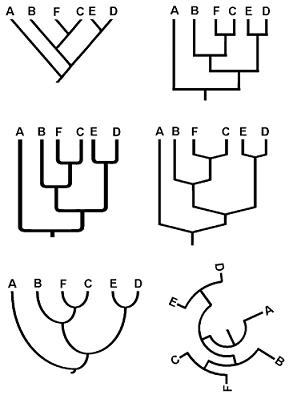Quote:
Originally Posted by Neapolitan

So are you agreeing with me by saying that the critea of defining a species should have two qualifiers:
1. hybridization barriers
2. genetic information
Whether there are other qualifiers, I can't think of any at the time, but I think at least both should be taken in consideration.
|
No to hybridization barriers. I've already written a few points now about why I don't think it's a very good criteria in previous posts.
Genetic information? I'm slightly confused as to what you mean.
In my latest post, I mentioned it might be possible to determine species based on sequencing data. It's not a new idea, it's already being done. However, I mentioned that in the future, it might be possible to do whole-genome sequencing quickly and if you store whole genomes of organisms in a database with some tremendous calculating powers, that could be used to infer phylogeny on a grand scale.
A bit like this (for ghost insects) :

I argued that species should be based on monophylies. That would be one criteria, but you would need more of course. A monophyly is a group in a cladogram like the one above which includes all descendents of an ancestor. For example the bottom two are a monophyly. So are the bottom 3 or the bottom 7, but if you then leave out the last (
Haaniella dehaanii), you would have a paraphyletic group - one which does not include all descendents of an ancestor.
Monophylies can be said to have been on an evolutionary path which differs from other monophylies - which is why they form monophylies in the first place. It does not mean sexual isolation which promotes divergence, but rather divergence itself - coupled with common ancestry. Evolution takes them in a different direction from other monophylies. A different direction/divergence basically means their genes are becoming different.









 Linear Mode
Linear Mode
